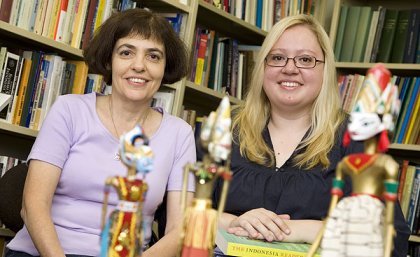
Research by a University of Queensland language graduate has allowed Indonesian women survivors to tell their stories for the first time.
PhD student Annie Pohlman is in the final stages of research, conducted over seven years, where she has spoken to women survivors of the 1965–1966 politically-motivated massacres in Indonesia.
The 1960s massacres are still somewhat taboo in Indonesia but Ms Pohlman’s research provided an opportunity for some women to speak out for the first time.
“Even though many of these women had husbands, children and family members die or taken from them, even though many of them were raped and tortured, they are not victims,” Ms Pohlman said of her research interviewees.
“One of the strongest and recurring stories that came out of this research was of women, sometimes with great courage, sometimes out of desperation and fear, who did everything they could to survive and, most often, to ensure the survival of their children.”
Ms Pohlman’s studies are a long journey from her first Indonesian language lesson in Grade 5 at Gin Gin State Primary School.
She continued to study the language through to university level and her interest in her PhD topic developed while studying for her undergraduate degree, a Bachelor of Arts with a double major in Indonesian Studies.
“In 2002, I spent a year studying in Indonesia with the ACICIS (Australian Consortium for In-Country Indonesian Studies) programme. During that time, I spent some months interviewing women who had been political prisoners under the former political regime,” Ms Pohlman said.
The Indonesian killings of 1965–1966 were a violent anti-Communist purge, following a military coup. The coup led to what is known as the “New Order” in Indonesia and the beginning of President Suharto’s thirty-year rule.
“From 1965 to 1966, approximately 500,000 men, women and children were massacred and a further 1.5 million were imprisoned as part of these purges. The women I interviewed were mostly those who had been imprisoned, some for as long as 20 years,” Ms Pohlman said.
The PhD thesis is called "Ashes in My Mouth: Women, Testimony and Violence during the Indonesian Massacres of 1965–1966" and has been undertaken through the School of Languages and Comparative Cultural Studies (SLCCS). It is in its final stages of completion.
Ms Pohlman said her Indonesian language and cultural skills were vital to the research project and she hopes her research brings awareness to the topic.
“The courses in SLCCS are designed so that you learn language in context. Without understanding the society and culture of a place, the language means nothing,” Ms Pohlman said.
“Since the fall of Suharto in 1998, there have been some great efforts to uncover the bloody origins of his regime in 1965–1966.
“After meeting women who had been persecuted by this regime, doing my PhD on what had happened to them in the hope of contributing to advocacy efforts was a natural choice,” she said.
“I hope that my thesis can help, in some small way, widen advocacy efforts on behalf of 1965 survivors. Part of combating genocide denial is collecting evidence of the atrocities committed.”
Annie Pohlman currently works part-time in the School of History, Philosophy, Religion and Classics as a history lecturer; and part-time for the Asia-Pacific Centre for the Responsibility to Protect, which aims to prevent genocide and other mass atrocities in the Asia-Pacific region.
Media: Annie Pohlman (07 3346 6447, 3365 6311, a.pohlman@uq.edu.au) or Liz Kerr (07 3365 6311, e.kerr@uq.edu.au)




